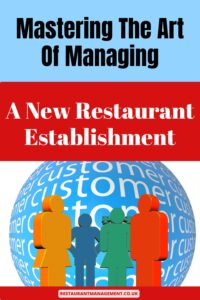How to Manage a New Restaurant Business
With the new year approaching, it’s time to put your dreams into action. Starting a restaurant in the UK sounds pretty exciting, doesn’t it? Oh, but wait, before we get ahead of ourselves, there’s much more to it than just cooking great food. You’ve got to juggle a bunch of things like the location, staff, licensing, and, of course, making sure the numbers add up at the end of the day. There’s no need to stress; we’ll go through it gradually so you can manage it like an expert., even if it feels like you’re just trying to keep your head above water sometimes. Ready? Let’s dive into mastering the art of managing a new restaurant establishment!
Why Effective Restaurant Management Matters
So, you might be thinking, “Why does planning really matter that much?” Well, the UK’s restaurant scene is pretty intense. With rising costs, changing food trends, and, oh yeah, economic ups and downs, you’ve got to be on your game to keep up. And it’s not just about managing the business—it’s about leading it. Great leadership can transform an ordinary restaurant into a go-to spot everyone’s talking about. No pressure, though!

Planning and Conceptualisation
Identifying Your Niche
Before launching a restaurant, understanding your target audience is crucial. The UK dining scene is incredibly diverse, with customers looking for everything from plant-based dishes to quick, convenient meals. The first step is identifying the gap in your local market. Are people craving more vegan-friendly spots, international cuisine, or a relaxed café vibe? Once you know what’s missing, you’re closer to success. Whether you go for fine dining or casual fare, your niche will define the type of customers you attract and the experience they expect. The right niche is key to standing out in a competitive market.
Crafting a Unique Restaurant Concept
Creating a memorable restaurant concept goes beyond just serving good food. Your brand should be consistent across all aspects—décor, menu, and even the type of music playing in the background. The restaurant’s theme could range from rustic to modern or be inspired by a particular culture or region. The menu should reflect this concept—if you’re offering a coastal vibe, seafood should be a prominent feature. Everything, from the logo to the colour scheme, should align with the overall identity you’re building. A unique and cohesive concept attracts customers and keeps them coming back for more.
Creating a Business Plan
While it’s tempting to dive straight into opening, a well-thought-out business plan is essential. This roadmap includes everything from financial goals to staffing needs, as well as an in-depth market analysis. You’ll also need to consider operational costs, especially in the UK, where business rates and utility expenses can be high. Don’t forget about seasonal fluctuations—during holidays or tourist off-seasons, revenue might dip, and your plan needs to account for that. Creating a solid business plan helps secure financing and serves as a guide for long-term sustainability and growth.
Location and Infrastructure
Choosing the Right Location
The location of your restaurant can make or break your business. High foot traffic and easy access to public transportation are essential factors to consider. Popular areas, especially in cities like London, can offer superb visibility but come with significantly higher rent. However, operating in less expensive areas outside major cities may require more effort to attract customers. Striking the right balance between rent costs and potential revenue is critical. Assessing local competition, demographics, and the economic conditions of your chosen area is just as important as ensuring that your restaurant has a steady stream of potential customers.
Designing the Layout and Ambiance
The design of your restaurant plays a significant role in customer experience. The UK dining culture places a high value on ambience, and your layout should reflect the mood you want to create, whether it’s a cosy pub setting or a sleek, minimalist interior. Remember, the kitchen’s design is just as important as the dining area. A well-organised kitchen can increase efficiency, helping staff prepare meals more quickly. Additionally, compliance with UK health and safety standards is non-negotiable. The layout should allow your team to work comfortably while keeping the operation safe and seamless for both staff and customers.
The Ultimate Guide to Fast Food Restaurant Management Systems
Licensing and Legal Compliance
Acquiring the Necessary Permits and Licenses
One of the least glamorous yet most crucial steps in opening a restaurant in the UK is obtaining the necessary permits and licenses. You’ll need food service licenses, health permits, and potentially a liquor license if you plan to serve alcohol. Each of these permits is vital for staying on the right side of the law, and failing to secure them could result in steep fines or even closure. Local councils in the UK regulate these licenses, so be sure you know all legal requirements. Proper licensing ensures your business operates legally and smoothly from day one.
Ensuring Food Safety Compliance
In the UK, food safety is not just a recommendation—it’s a legal requirement. Your restaurant’s hygiene rating will be public, and customers often check this rating before deciding where to eat. A poor score can seriously damage your reputation. Therefore, ensuring your kitchen meets the highest food safety standards is essential. This includes regularly training staff on proper hygiene practices and keeping your kitchen clean at all times. The Food Standards Agency monitors compliance with food safety regulations, so you’ll need to stay on top of their guidelines to keep your rating high.

Building the Right Team
Hiring the Right Staff
Building the right team is fundamental to your restaurant’s success. The front-of-house team, which includes hosts, servers, and bartenders, should be friendly, approachable, and well-versed in customer service. On the other hand, the back-of-house team, including chefs and kitchen staff, must have the technical skills to execute your menu efficiently and consistently. In the UK, the importance of good customer service cannot be overstated, as it significantly impacts customer retention. A well-balanced team that excels in both customer service and culinary execution will create a smooth and enjoyable dining experience that keeps customers coming back.
Hiring talented staff is just the beginning; ongoing training and development are equally important. The restaurant industry is fast-paced and constantly evolving, especially with frequent changes in food trends and regulations in the UK. Regular training sessions ensure your team is up-to-date on food safety regulations, menu changes, and customer service practices. Onboarding new employees effectively sets the tone for your restaurant’s culture, while continuous learning opportunities keep the team motivated and performing at their best. Well-trained staff will help your restaurant run smoothly, improve customer satisfaction, and adapt quickly to any operational challenges.
Menu Development and Pricing
Designing a Menu that Sells
Crafting a menu isn’t just about offering delicious dishes—it’s also about psychology. The way you design and present your menu can influence customer choices, leading them toward your most profitable items. Using visual cues like highlighting certain dishes or placing them strategically can nudge customers into selecting higher-margin items. However, balance is crucial. Offering too many options can overwhelm both your kitchen and your customers. In the UK, a focused menu that provides variety but doesn’t overextend your resources is the key to keeping costs down while still satisfying a broad range of customer preferences.
Managing Food Costs and Supplier Relationships
Keeping food costs under control is vital to maintaining profitability, but this doesn’t mean sacrificing quality. Building strong relationships with reliable suppliers is crucial for securing fresh, high-quality ingredients at reasonable prices. Seasonal menus can be a great way to manage costs while offering customers fresh, exciting dishes. In the UK, where sustainability is becoming more important to diners, working with local suppliers helps control costs and enhances your restaurant’s appeal. Being mindful of ingredient costs and maintaining transparency with your suppliers will allow you to create dishes that offer great value without compromising quality.
Marketing and Customer Engagement
Creating a Strong Brand Presence
Your restaurant’s brand is more than just the food you serve—it’s the entire experience you offer. In today’s competitive market, particularly in the UK, having a strong, recognisable brand is key to standing out. This includes a compelling logo, a well-designed website, and consistent messaging across all platforms. Your brand should reflect your restaurant’s personality, whether it’s upscale and elegant or casual and laid-back. Strong branding helps build customer loyalty, as people are more likely to return to a place that resonates with their identity. A cohesive brand presence can help attract customers and foster a loyal following.
Digital Marketing and Social Media Strategy
In the digital age, you’re missing out on a massive opportunity if your restaurant isn’t active on social media. Platforms like Instagram and TikTok are essential for showcasing your dishes and engaging with customers in the UK. Posting high-quality photos of your food and behind-the-scenes videos can attract attention and build excitement around your brand. Additionally, a user-friendly website with an integrated reservation system is critical for managing bookings and ensuring a smooth customer experience. A well-executed digital marketing strategy drives online engagement and brings more diners through your doors, increasing your restaurant’s visibility and success.
Local Marketing and Partnerships
In addition to digital marketing, local marketing and partnerships can effectively build a strong community presence. Collaborating with nearby businesses and local food influencers or even hosting events can help drive traffic to your restaurant. Partnerships allow you to tap into existing customer bases and gain exposure to new audiences. Offering discounts or special promotions through these partnerships can also encourage first-time visitors to try your restaurant. Building relationships within your local community will increase your restaurant’s visibility and help create a loyal customer base that feels a connection to your business.

Day-to-Day Operations Management
Establishing Standard Operating Procedures (SOPs)
Clear Standard Operating Procedures (SOPs) are crucial for maintaining consistency in your restaurant’s operations. SOPs outline specific steps for everything from food preparation and service to cleaning protocols and customer interactions. Having clear, written procedures ensures that your staff can deliver a consistent dining experience every time, regardless of who’s working. Regularly reviewing and updating your SOPs is also essential, especially as new regulations or menu items are introduced. Properly trained staff who understand and follow these procedures will help streamline daily operations, minimise mistakes, and ultimately lead to greater efficiency and customer satisfaction.
Inventory and Supply Chain Management
Effective inventory management is vital to running a successful restaurant, particularly in today’s unpredictable post-Brexit supply chain environment. Implementing an inventory tracking system can help you monitor stock levels and prevent over-ordering, which leads to waste, or under-ordering, which can cause shortages. Having multiple suppliers for critical ingredients is also wise to ensure you’re not left without essential items. In the UK, where supply chain disruptions have become more common, having a flexible and well-organised inventory management system allows you to adapt quickly to changes and maintain smooth operations without compromising the quality of your food or service.
Handling Customer Service and Feedback
Exceptional customer service is a hallmark of any successful restaurant. Training your staff to handle customer inquiries and complaints with grace is critical to ensuring a favourable dining experience. In the UK, diners value both quality food and attentive service, so exceeding their expectations in both areas is a must. Encourage your staff to ask for customer feedback through online reviews or in-person conversations and use this information to make improvements. Handling complaints promptly and professionally helps resolve issues and demonstrates your commitment to customer satisfaction, which is key to building long-term loyalty and repeat business.
Financial Management
Managing Cash Flow and Profit Margins
Cash flow management is essential for maintaining a healthy business. Tracking daily, weekly, and monthly cash flow allows you to identify trends and make adjustments to improve profitability. Keeping a close eye on profit margins is also crucial, especially when it comes to food costs, which should ideally be maintained around 30-35%. In the UK, rising operational costs such as rent and utilities mean you need to regularly assess your pricing strategy to ensure you’re maintaining healthy margins. Proper financial management will help you avoid cash flow problems and keep your restaurant on a path to long-term success.
Payroll, Taxes, and Accounting
Payroll and taxes are complex but essential parts of running a restaurant. In the UK, you’ll need to ensure that you comply with HMRC tax regulations, including VAT and corporation tax. Using payroll software can simplify the process of paying your staff and handling deductions. It’s also a good idea to work closely with an accountant who understands the intricacies of UK tax law. They can help you navigate the complexities of tax filings, payroll, and financial reporting, ensuring you stay compliant while optimising your restaurant’s financial health. Proper accounting practices can make a significant difference in your overall profitability.
Technology and Innovation
Utilising Restaurant Management Software
Technology has revolutionised the restaurant industry, making operations more efficient than ever. Implementing a robust restaurant management software system, such as a Point of Sale (POS) system, can streamline everything from order taking to inventory management. These systems allow you to track sales, monitor stock levels, and even handle reservations all in one place. In the UK, where speed and efficiency are critical to success, having a management system that reduces paperwork and automates key tasks gives you more time to focus on improving customer service and growing your business.
Embracing Emerging Technologies
With the rise of contactless payments and online ordering, restaurants in the UK are increasingly adopting new technologies to meet customer expectations. Offering delivery through apps like Eat, Deliveroo, or UberEats can significantly boost your sales by reaching customers who prefer to dine at home. Additionally, integrating contactless payment systems and self-service kiosks can enhance the in-house dining experience by reducing wait times and improving efficiency. Staying up-to-date with emerging technologies enhances your restaurant’s operational capabilities and meets the changing demands of tech-savvy UK diners, giving you a competitive edge in the market.
Restaurant General Manager’s Competencies: Unlimited Drive For Results
Monitoring Performance and Growth
Tracking Key Performance Indicators (KPIs)
To ensure your restaurant is on the path to success, monitoring Key Performance Indicators (KPIs) is essential. KPIs such as revenue per seat, table turnover rate, and food cost percentages provide valuable insights into the health of your business. Regularly tracking these metrics allows you to identify areas that need improvement and make data-driven decisions to optimise operations. In the UK, where competition is fierce, using KPIs to measure customer satisfaction, staff performance, and financial health can make a significant difference in staying ahead of the curve and ensuring long-term profitability.
Expanding and Scaling Your Restaurant Business
Careful planning is crucial if you’re considering expansion, whether by opening a second location or franchising. Expanding can increase revenue, but it also comes with additional challenges, such as higher operational costs, the need for more staff, and potential market saturation. Conducting thorough market research is essential to ensure your concept is in demand in new locations. Franchising can offer a less risky way to scale but requires a solid brand and operational model. Weigh the pros and cons carefully before expanding, as successful growth requires strategic planning, adequate resources, and a scalable business model.
Related articles:
Analytical Thinking In Restaurant Management
Ultimate Restaurant Management Tips
Monday Routine For Restaurant Managers
Conclusion
Mastering the art of managing a new restaurant establishment is all about the successful management of a new restaurant which involves juggling many roles, from visionary leader to meticulous planner. Identifying your niche, crafting a compelling concept, and establishing strong operational procedures would help you create a dining experience that makes a memorable impact and inspires customers to return. Staying ahead of industry trends, fostering a well-trained team, and leveraging technology are key to maintaining a competitive edge in the UK’s vibrant dining scene. Adaptability and continuous improvement will help you overcome obstacles and create a path for enduring success. By implementing careful strategies and commitment, your ideal restaurant can succeed in the most demanding markets.
Answers to Frequently Asked Questions
How to manage a newly opened restaurant?
Managing a new restaurant requires strong planning and organisational skills. Start by mastering the art of managing a new restaurant establishment an create a solid business plan that outlines financial goals, staffing needs, and operational strategies. Hire the right team and invest in their training to ensure seamless service. Implement restaurant management software to track inventory, reservations, and sales. Additionally, focus on marketing efforts to build your brand and attract customers. Regularly review performance metrics to identify and address challenges early.
How to be successful in managing a restaurant?
Success in restaurant management comes from balancing quality and efficiency. Provide excellent customer service, maintain high food safety standards, and control costs without compromising quality. Build strong relationships with suppliers to guarantee steady ingredient quality and pricing. Use digital marketing to connect with potential customers and adjust your offerings based on customer input to enhance them. Consistent leadership and the ability to innovate based on market trends are essential.
What is the key to the success of a restaurant?
The secret to a restaurant’s prosperity is its capacity to provide an unforgettable dining experience. This includes offering high-quality food, exceptional service, and an inviting ambience. Effective financial management is crucial, as is controlling food costs and optimising profit margins. Additionally, a strong marketing strategy and adaptability to trends, like sustainability or digital engagement, play significant roles in standing out in a competitive market.
How can you be a great general manager of a restaurant?
A great general manager is a strong leader who can effectively inspire and manage their team. They must possess excellent problem-solving skills, ensuring smooth daily operations and addressing issues promptly. Being knowledgeable about all aspects of the business, from financial management to customer relations, is crucial. Regularly communicating with staff, monitoring performance, and helping training opportunities maintain high standards. Lastly, staying customer-focused and encouraging feedback ensures the restaurant consistently meets or exceeds expectations.


